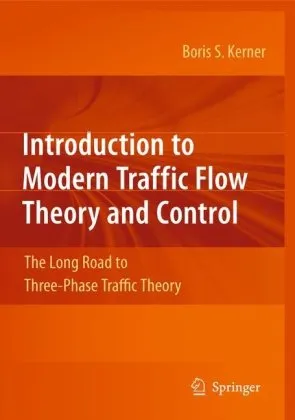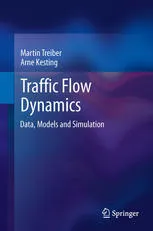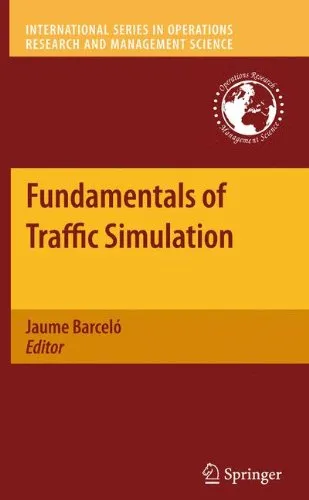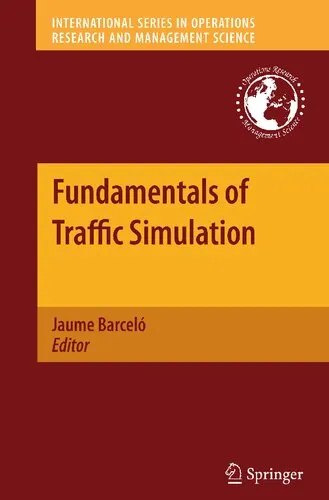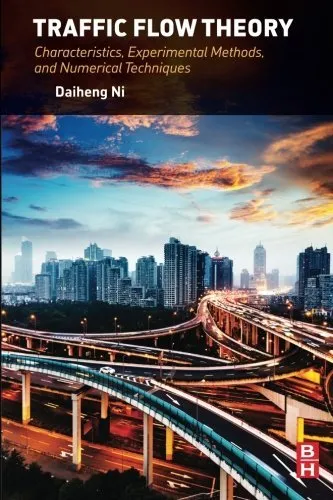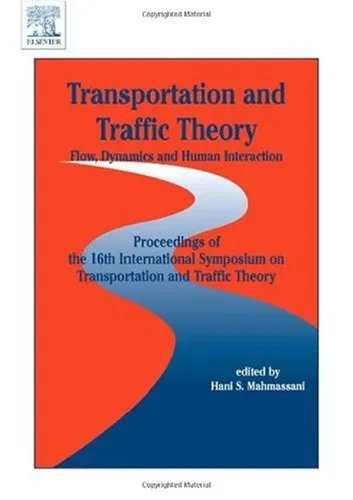Introduction to Modern Traffic Flow Theory and Control: The Long Road to Three-Phase Traffic Theory
4.0
بر اساس نظر کاربران

شما میتونید سوالاتتون در باره کتاب رو از هوش مصنوعیش بعد از ورود بپرسید
هر دانلود یا پرسش از هوش مصنوعی 2 امتیاز لازم دارد، برای بدست آوردن امتیاز رایگان، به صفحه ی راهنمای امتیازات سر بزنید و یک سری کار ارزشمند انجام بدینکتاب های مرتبط:
Persian Summary
معرفی کتاب
کتاب "Introduction to Modern Traffic Flow Theory and Control: The Long Road to Three-Phase Traffic Theory" اثری بیبدیل از بوریس اس. کرنر است که به بررسی عمیق و جامع نظریه مدرن جریان ترافیک و کنترل آن میپردازد. این کتاب به خصوص به نظریه سهفازی ترافیک میپردازد که انقلابی در درک و مدیریت ترافیک ایجاد کرده است.
خلاصهای جامع از کتاب
این کتاب با تشریح پایههای نظری ترافیک آغاز میشود و سپس با نگاهی دقیق به مدلهای جریان ترافیک، تحلیل روشهای کنترل و ویژگیهای شاخص ترافیک مدرن، ادامه مییابد. کرنر به توضیح و بسط ایدهها و تکنیکهای جدیدی میپردازد که در قالب نظریه سهفازی ترافیک قرار میگیرند. کتاب شامل مطالعات موردی و مدلهای ریاضی است که به درک عمیقتر پدیدههای ترافیکی کمک میکند. بخشهای مختلف کتاب به مسائلی همچون تشکیل ترافیک جامد، تحلیل پایداری و راهبردهای کنترل ترافیک اختصاص دارد که به طور دقیق و علمی مورد بررسی قرار گرفتهاند.
نکات کلیدی کتاب
- تبیین تفاوتهای بین نظریه ترافیک دو فازی و سهفازی.
- ارائه راهبردهای جدید برای مدیریت بهینه ترافیک.
- تحلیل تأثیرات اجتماعی و اقتصادی ترافیک بر زندگی شهری.
- مقایسه و بررسی مدلهای مختلف ترافیکی و کاربرد آنها در مهندسی ترافیک.
نقلقولهای معروف از کتاب
"نظریه سهفازی، فراتر از چارچوبهای سنتی میرود و نگاه جدیدی به پیچیدگیهای جریان ترافیک ارائه میکند."
"درک صحیح رفتار ترافیکی، کلید حل مشکلات شهری است که در هر جامعهای به وضوح دیده میشود."
چرا این کتاب مهم است؟
کتاب "Introduction to Modern Traffic Flow Theory and Control" برای مهندسان ترافیک، پژوهشگران، و دانشجویان این حوزه، منبعی بینظیر و ضروری به شمار میآید چرا که به شکلی سیستماتیک و جامع، نظریههای پیچیده ترافیک و کنترل آنها را به زبانی علمی و در عین حال قابل فهم شرح میدهد. با استفاده از مدلهای ریاضی و بررسی تجربی، این کتاب فرصتی فراهم میکند تا با ابعاد گوناگون مسائل ترافیکی آشنا شویم و راهحلهای عملی موثرتری ارائه دهیم. همچنین اهمیت این کتاب در ارائه نگاهی نو و متفاوت به مشکلات ترافیکی است که میتواند تأثیر مهمی بر سیاستگذاریهای شهری و توسعه پایدار داشته باشد.
Introduction to the Book
Welcome to the fascinating world of modern traffic flow theory, where science meets the complexity of real-world traffic systems. This book, "Introduction to Modern Traffic Flow Theory and Control: The Long Road to Three-Phase Traffic Theory," provides a pioneering look into the dynamic and intricate nature of traffic flow, patiently unraveling the complexities of why and how traffic congestion happens and why it sometimes defies common sense.
Detailed Summary of the Book
The book offers a comprehensive exploration of traffic flow theory, focusing significantly on the three-phase traffic theory. Unlike traditional models that mainly consider free flow and congested traffic phases, this book introduces a third phase: synchronized flow. This novel perspective helps to bridge the gap in understanding the nuances within transitional states of traffic. The author meticulously explains the transition between phases and provides mathematical models that accurately depict these transitions, enabling readers to understand complex traffic systems better.
Beyond theory, the book delves into practical control solutions that can alleviate traffic congestion. Using clear formulations and real-world examples, it presents various traffic control strategies, illuminating how they can be employed to optimize traffic performance and reduce congestion. The control methods discussed are grounded in the theoretical advances presented earlier in the book, providing a cohesive understanding of how theory informs practical application.
Key Takeaways
- A detailed understanding of three-phase traffic theory and how it improves upon traditional two-phase models.
- Insight into the fundamental principles that govern traffic flow, backed by solid mathematical modeling.
- An understanding of the various transitions between traffic phases and how they can be managed effectively.
- Practical control strategies that can be implemented to manage traffic congestion in real-world scenarios.
- Engaging discussion of how traffic flow theories have evolved over time, setting a foundation for future innovations.
Famous Quotes from the Book
"Three-phase traffic theory reveals the hidden patterns in traffic flow that were previously unexplained by classical models, offering sophisticated solutions to age-old congestion problems."
"Understanding the transitions between traffic phases is not merely an academic exercise; it is a necessary step towards creating more efficient and effective traffic control systems."
Why This Book Matters
This book is an essential read for traffic engineers, urban planners, and anyone interested in the future of traffic management. Its relevance lies in its groundbreaking approach to dissecting and understanding the nuances of traffic flow through the lens of three-phase traffic theory. By addressing gaps left by traditional models, the book provides a more robust framework for analyzing and interpreting traffic data.
Moreover, the book serves as a bridge between theory and practice, equipping readers with the knowledge necessary to develop advanced traffic systems. It fosters a deeper appreciation for the complexity of traffic dynamics, emphasizing the importance of innovative solutions to the global issue of traffic congestion. Whether you're an academic, a practitioner, or an enthusiast, this book offers valuable insights that will broaden your understanding and perhaps inspire the next breakthrough in traffic management.
دانلود رایگان مستقیم
شما میتونید سوالاتتون در باره کتاب رو از هوش مصنوعیش بعد از ورود بپرسید
دسترسی به کتابها از طریق پلتفرمهای قانونی و کتابخانههای عمومی نه تنها از حقوق نویسندگان و ناشران حمایت میکند، بلکه به پایداری فرهنگ کتابخوانی نیز کمک میرساند. پیش از دانلود، لحظهای به بررسی این گزینهها فکر کنید.
این کتاب رو در پلتفرم های دیگه ببینید
WorldCat به شما کمک میکنه تا کتاب ها رو در کتابخانه های سراسر دنیا پیدا کنید
امتیازها، نظرات تخصصی و صحبت ها درباره کتاب را در Goodreads ببینید
کتابهای کمیاب یا دست دوم را در AbeBooks پیدا کنید و بخرید
1680
بازدید4.0
امتیاز0
نظر98%
رضایتنظرات:
4.0
بر اساس 0 نظر کاربران
Questions & Answers
Ask questions about this book or help others by answering
No questions yet. Be the first to ask!
